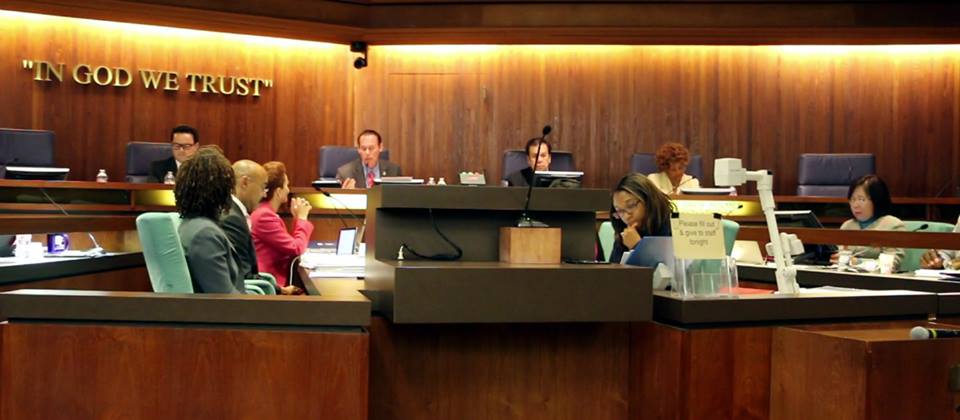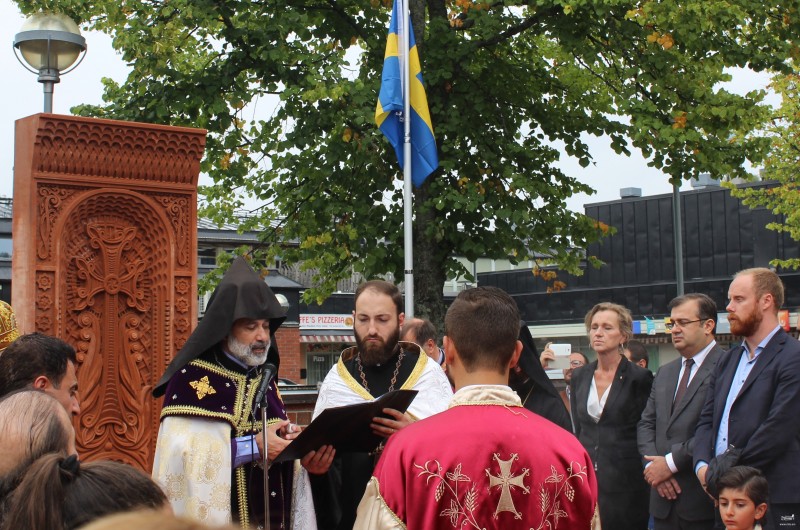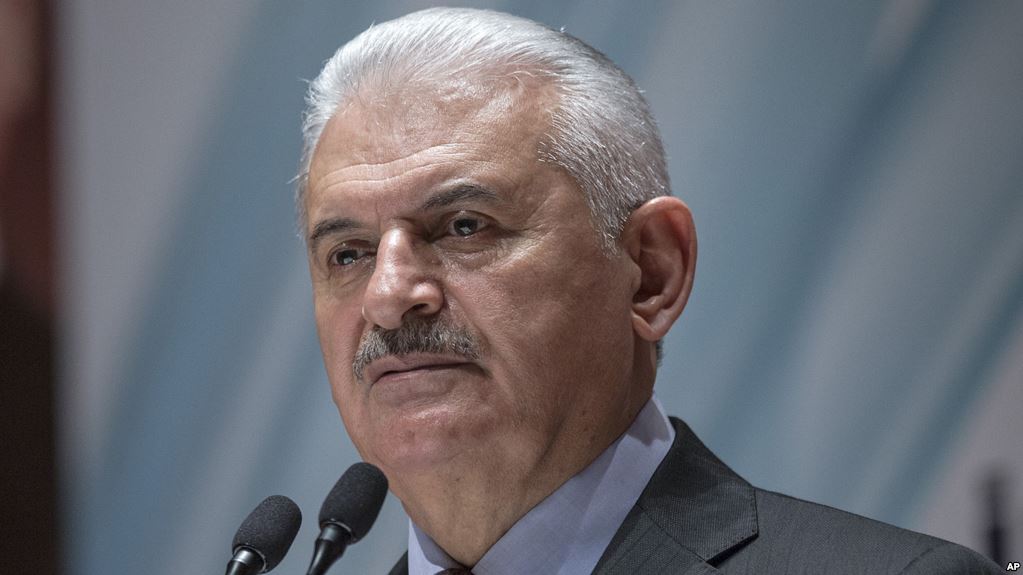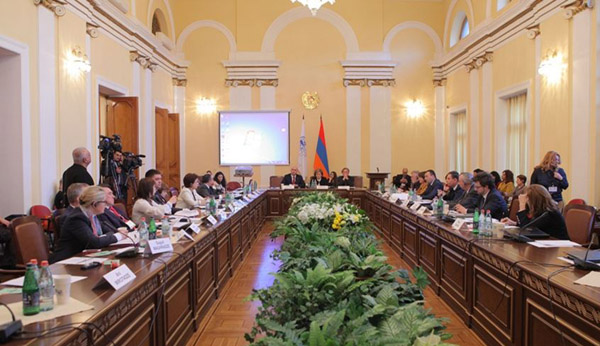WASHINGTON, DC – Beginning last week, Members of Congress from California, Massachusetts, Michigan, and New Jersey delivered statements in Congress recalling the anti-Armenian pogroms that took place in Sumgait, Kirovabad, and Baku from 1988 to 1990. The violent pogroms in Azerbaijan resulted in hundreds dead, and over 450,000 Armenians displaced. Senator Gary Peters (D-MI), and Representatives Judy Chu (D-CA), Katherine Clark (D-MA), Jim Costa (D-CA), Frank Pallone, Jr. (D-NJ), Adam Schiff (D-CA), and Brad Sherman (D-CA) delivered statements recalling the horrific ethnic cleansing of Armenians from Azerbaijan during the waning days of the Soviet Union.
Citing the outbreak of the anti-Armenian pogroms in Sumgait, Azerbaijan 27 years ago, Senator Gary Peters (D-MI) said “the citizens of Nagorno Karabakh peacefully petitioned to be reunited with Soviet Armenia and spoke out against the arbitrary borders established by Joseph Stalin and the Soviet Union. This democratic exercise of free speech expressing a natural desire for self-determination was met with three days of violence and brutality against Armenian civilians, who were hunted down in their homes,” Peters stated. “The massacres of Armenians did not stop in Sumgait but were followed in other Azerbaijani towns such as Kirovabad in November 1988 and the capital Baku in January 1990.” Reaffirming the United States record in support of the democratic aspirations of Artsakh, “the U.S. Congress strongly condemned these massacres at that time,” he said. “Hundreds of thousands of Armenians fled Azerbaijan, many finding their home in my State of Michigan, where there is a monument to the victims of the Sumgait massacres,” stated Senator Peters.
Congressman Adam Schiff (D-CA), a champion of Armenian American issues, reminded his colleagues that “the Sumgait massacres led to wider reprisals against Azerbaijan’s Armenian ethnic minority, resulting in the virtual disappearance of a once thriving population of 450,000 Armenians living in Azerbaijan, and culminating in the war launched against the people of Nagorno Karabakh.” “Time has not healed the wounds of those killed and hurt in the pogroms in Sumgait, Kirovabad, and Baku,” Schiff said. He also pointed to the “hatred of Armenians…celebrated in Azeri society, a situation most vividly exemplified by the case of Ramil Safarov, an Azerbaijani army captain who savagely murdered an Armenian army lieutenant, Gurgen Margaryan with an axe while he slept.” Schiff also stated that “this April we will mark the 100th Anniversary of the Armenian Genocide, an event the Turkish government, Azerbaijan’s closest ally, goes to great lengths to deny.” “We must not let such crimes against humanity go unrecognized, whether they occurred yesterday or 27 years ago or 100 years ago,” Schiff said.
Founder and Co-Chair of the Congressional Caucus on Armenian Issues, Rep. Frank Pallone, Jr. (D-NJ) stood on the floor of the House and told his colleagues how “In 1988, Armenians living in the town of Sumgait in Azerbaijan were burned alive, thrown from windows and senselessly murdered by Azerbaijanis. Hundreds of people were killed, raped, and maimed simply because they were Armenians,” Pallone said. “The police forces turned a blind eye towards the situation and allowed the crimes to continue for three days without intervention. Since then, Azerbaijan has sought to cover up these crimes and rewrite history,” stated Congressman Pallone. “We have a shared responsibility to speak out when groups of people are targeted with oppression and violence just because of their ethnicity,” he said. “Along with my colleagues on the Congressional Armenian Issues Caucus, I continue my efforts to try and shed light on these events so that those lives lost are not forgotten,” said Pallone.
Joining him on the floor was Congressman Jim Costa (D-CA), who said that his Central Valley district “is home to thousands of Armenian Americans, many who are the sons and daughters of survivors” of Azeri pogroms. “As we recognize this tragedy, we should also take this time to commend the people of Nagorno Karabakh on being the first to demand their right to freedom and self-governance from the Soviet Union. Although a small nation, Nagorno Karabakh sparked the democracy movement that ended decades of dictatorial rule in the USSR and eventually led to the fall of the Soviet Union,” Costa said. He stressed that “the Azerbaijani government continues to act as an aggressor today,” citing the attack on a Nagorno Karabakh helicopter near the line of contact last November “killing the three crew members on board.” “This aggression is completely unacceptable and further hurts efforts to achieve a peaceful resolution,” stated Congressman Costa.
Congresswoman Katherine Clark (D-MA) likewise referenced her Armenian American constituents. “I am proud to stand today with the Armenian American community, including many of my constituents in Massachusetts, in remembrance and mourning of this unspeakable tragedy,” she said. Clark described the “anti-Armenian rallies through Azerbaijan” which “gave way to waves of ethnically-motivated violence, death and destruction,” resulting in an “Armenian community all but disappeared, with thousands displaced.” Clark reminded her colleagues that “many displaced Armenian families have sought refuge in America, and are now making vital contributions in the Fifth District of Massachusetts. Proudly, our diverse District is home to one of the largest Armenian communities in the nation. Together, our community is a thriving example of strength and perseverance in the face of extreme adversity,” Clark said.
In addition, Congressman Brad Sherman (D-CA) gave a lengthy description of the fate of Armenians living in and fleeing from Azerbaijan at the time. He carefully articulated the targeted killings of Armenians. He then turned to the role of the United States in achieving a lasting peace in the region. “Recognizing the ethnic-cleansing of the Armenians from Azerbaijan is an important step. However, we need to do more–we need to demonstrate to Azerbaijan that the United States is committed to peace and to the protection of Artsakh from coercion,” Sherman said. “As the current government of Azerbaijan grows even more hostile towards Armenians, we must call for an end to all threats and acts of violence by Azerbaijan’s government against the Republic of Nagorno Karabakh.” Furthermore, “Congress should strengthen Section 907 of the FREEDOM Support Act by removing the President’s ability to waive U.S. law prohibiting aid to Azerbaijan because of its continuing blockade against Armenia and Nagorno Karabakh,” said Congressman Sherman. “Azerbaijan should not be provided aid from the United States as long as they continue a policy of threats and blockades against Artsakh. I urge the Administration to remove all barriers to broad-based U.S.-Nagorno Karabakh governmental and civil society communication, travel and cooperation,” Sherman said.
A leading voice in the Armenian Caucus, Congresswoman Judy Chu (D-CA) spoke on the House floor about the spirit of “the people of Nagorno-Karabakh,” and their united “call for a say in their own futures and greater independence from Azerbaijan,” she said. “This peaceful movement for self-determination and freedom was followed by premeditated and government-sponsored attacks. Over the next 2 years, the Armenian population in the territory of Artsakh was repeatedly victim to brutal and racially-motivated pogroms, darkly reminiscent of the days of the Armenian genocide,” Chu said. “As we commemorate the somber anniversary marking the struggle of the Nagorno-Karabakh people, we wish for the peaceful resolution of this conflict and hope that its citizens will be free to determine their own future,” Congresswoman Chu said.
Full statements are available here










